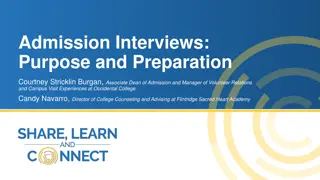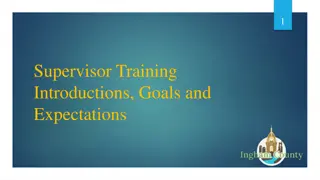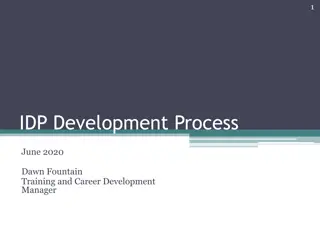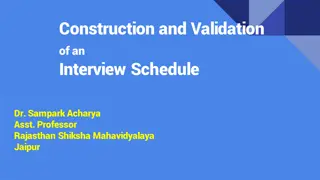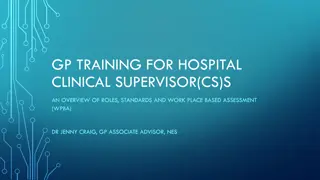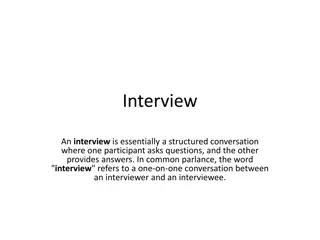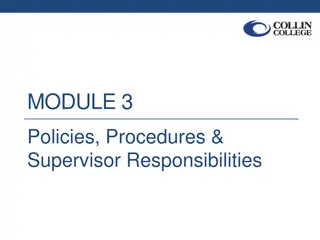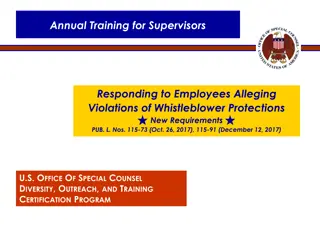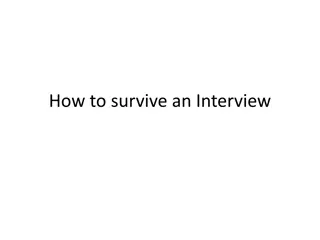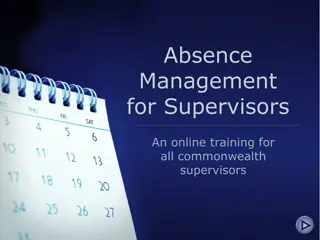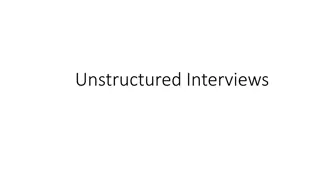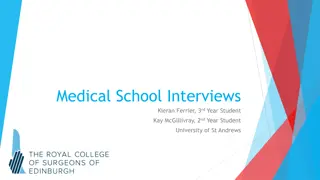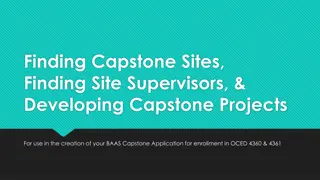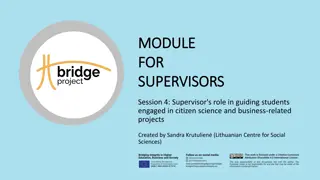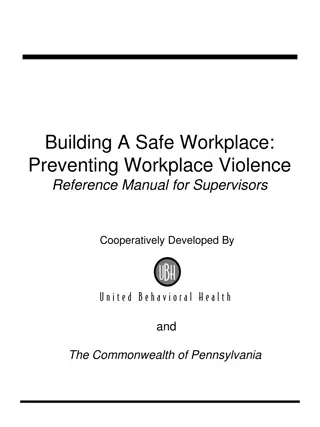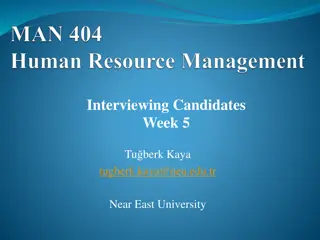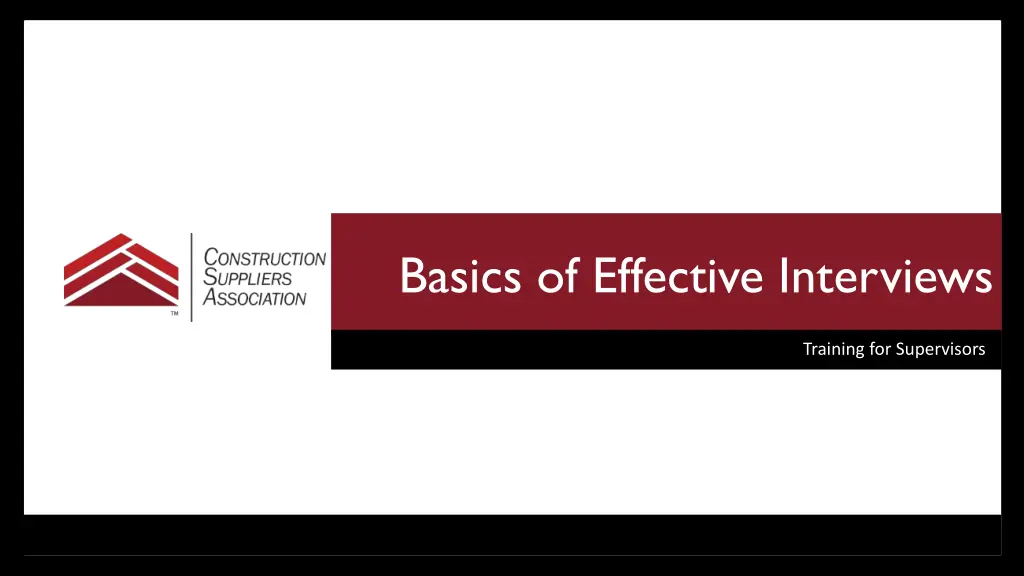
Effective Interview Training for Supervisors
Learn how to prepare for interviews, legal aspects to consider, and key strategies to hire the best candidates. Gain insights on crafting questions, conducting interviews, and adhering to legal guidelines to ensure fair and effective recruitment processes.
Download Presentation

Please find below an Image/Link to download the presentation.
The content on the website is provided AS IS for your information and personal use only. It may not be sold, licensed, or shared on other websites without obtaining consent from the author. If you encounter any issues during the download, it is possible that the publisher has removed the file from their server.
You are allowed to download the files provided on this website for personal or commercial use, subject to the condition that they are used lawfully. All files are the property of their respective owners.
The content on the website is provided AS IS for your information and personal use only. It may not be sold, licensed, or shared on other websites without obtaining consent from the author.
E N D
Presentation Transcript
Basics of Effective Interviews Training for Supervisors
INTRODUCTION With careful preparation, you can maximize the interview process. Crafting effective questions, obtaining the information you need and making a good impression on candidates are important aspects of the process. Phrasing questions properly and honing your listening skills and body language will make a significant difference in the responses that candidates give you. Providing information about the job and benefits may also help you win favor with applicants who have the skills the employer needs. This presentation provides you with information on how to accomplish these important goals and hire the very best people. Source: www.shrm.org
AGENDA Preparing for the Interview Legal Aspects The Interview Source: www.shrm.org
PREPARING FOR THE INTERVIEW Screen candidates by phone to ensure that they have the minimum qualifications and that the pay range for the position matches the person s requirements. Set aside a quiet place to talk. Allow sufficient time so that you will not be rushed. Source: www.shrm.org
PREPARING FOR THE INTERVIEW (CONT.) Prepare questions to ask each candidate. Review the job description and the candidate s resume and application immediately before meeting the candidate. Be ready to provide the candidate information about the company and the benefits offered to employees. Source: www.shrm.org
PREPARING FOR THE INTERVIEW (CONT.) Be sure to tell the candidate: Directions to the location, where to park and whom to ask for on arrival. If he or she will be required to complete an application onsite. How long the interview will probably take. Source: www.shrm.org
LEGAL ASPECTS Federal laws and some state laws pertain to interview questions, including those that focus on age, disability, race, religion, sex and marital status, national origin, and arrests and convictions. Be sure that you are consistent in obtaining the same information from all candidates for a position. It is important to prepare and consistently use the same questions for each interview and to follow a structured interview process. Doing this will help ensure that you treat all candidates equally and fairly and help you avoid any complaints of illegal discrimination. Source: www.shrm.org
LEGAL ASPECTS (CONT.) Be wary of volunteered information. Even when you ask only legal questions during an interview, you may receive information you would prefer not to know from applicants who make such a disclosure voluntarily. For example, an applicant may disclose that she is pregnant and will need time off for childbirth if she is hired. The best way to handle this situation is not to pursue it and not make any note of it. Just as you should ask only job-related questions, you must disregard any information the applicant voluntarily discloses that is not related to the job. Source: www.shrm.org
THE INTERVIEW At the start of the interview: Confirm that you have the completed and signed application. Offer a beverage. Monitor your nonverbal communication. Set the candidate at ease with small talk. Ask if the candidate has any questions before delving into your questions. Source: www.shrm.org
THE INTERVIEW (CONT.) As the candidate responds to your questions: Listen to the full answer before asking your next question. Take notes. Demonstrate unconditional positive regard. Ask probing and follow-up questions to obtain additional information. Source: www.shrm.org
THE INTERVIEW (CONT.) Candidates often arrive with an arsenal of prepared responses that may not be accurate portrayals of their competence. In response to rehearsed answers: Look at the candidate expectantly and wait for more. Ask a vague follow-up question: Can you tell me more about that? Ask specific follow-up questions. Source: www.shrm.org
THE INTERVIEW (CONT.) As you are closing the interview: Ask the candidate if there is anything else that the candidate would like to tell you about his or her qualifications. Ask if the candidate has any questions. Provide documents describing your company and benefits. Ask if the candidate is interested in the job based on the information you have provided during the interview. Source: www.shrm.org
THE INTERVIEW (CONT.) End the interview by: Telling the candidate when to expect further contact from you. Walking the candidate out and thanking him or her for interest in the company and the available position and for spending the time interviewing. Source: www.shrm.org
SUMMARY Prepare for the interview by conducting a screening phone interview, setting aside a quiet place to talk and allowing sufficient time for the meeting. Be sure the candidate has directions to your location and knows whom to ask for upon arrival. Be aware of legal aspects of interviewing including the federal laws and laws in some states that pertain to interview questions. Also, be consistent in asking the same questions for each position, and be wary of volunteered information that is not job- related. At the start of the interview, be sure you have a completed and signed application, monitor your nonverbal communication, set the candidate at ease with small talk, and ask if the candidate has any questions. Source: www.shrm.org
SUMMARY (CONT.) As the candidate responds to your questions, listen to the full answer before asking your next question. Take notes, and ask probing and follow-up questions to obtain additional information. Close the interview by asking if the candidate has any questions and by providing documents describing your company and benefits. End the interview by telling the candidate when to expect further contact from you and thanking him or her for interest in the company and the available position. Source: www.shrm.org




